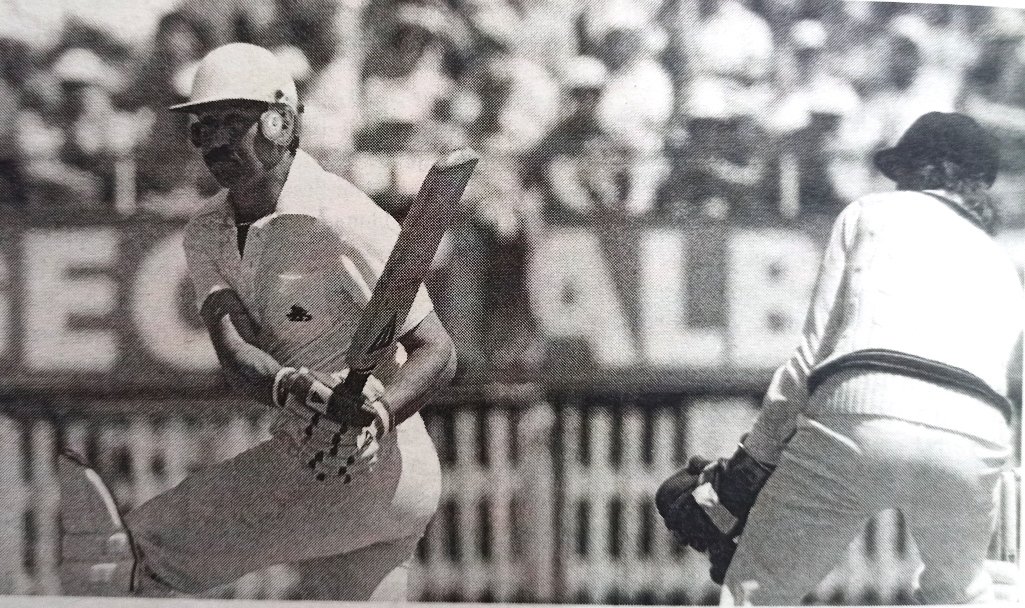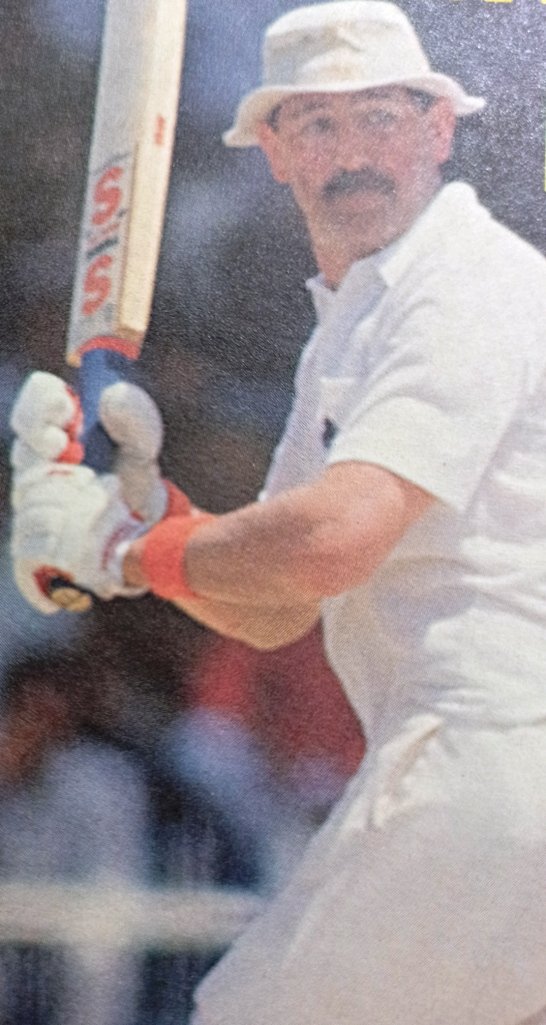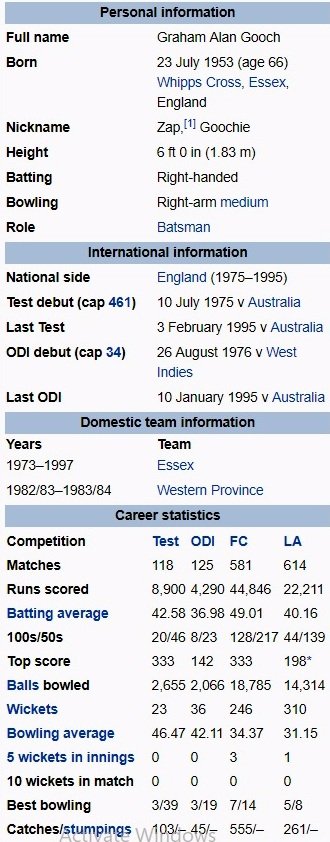In the last week of July 1997, England’s captain decided to make his last appearance in a first-class match. Graham Gooch, as a player, appropriately chose Essex’s match against Worcestershire, which began on his 44th birthday on July 23, 1997. Unfortunately, it turned out to be a sad and soggy affair at Chelmsford, as rain played havoc with the match to a great extent.
Statistically, the highlight of an inevitably drawn encounter belonged not to Graham Gooch but to Graeme Hick’s 94th first-class century. But those who were present at the ground—nearly 4,000 spectators—reserved the biggest and loudest cheers for their beloved departing son.
Graham Gooch, who quit playing for England after a disappointing tour of Australia in 1994–95, severed a 24-year-old link with first-class cricket and, throughout, played for Essex in England during the summer. Gooch takes his leave from active cricket to solely concentrate on his job as an England selector and possibly as a successor to David Lloyd as the senior team’s coach later on.
However, Graham Gooch’s final innings lasted 26 deliveries in a span of just over half an hour before Alamgir Sheriyar, bowling left-arm over the wicket, induced him into playing a false stroke and sent his leg-stump cartwheeling after Gooch had made 11. But a few deliveries before his dismissal, Gooch had played a vintage cover drive off the same bowler for four that left the fielders like statues.
Certainly, that was Graham Gooch’s most profitable stroke that got many of his runs during an illustrious career. Gooch’s final day on a playing field lasted only half a day in terms of playing time. When it was all over, Graeme Hick, standing at the non-striker’s end, and the entire Essex team, led by Paul Prichard, shook hands with Gooch for the last time on a playing field.
Near the pavilion’s gate, Worcestershire captain and former Australian batsman Tom Moody stepped forward to embrace Gooch warmly as the crowd cheered on. Here was Gooch, now clean-shaven and bareheaded, acknowledging the cheers in a brief speech of thanks from the dressing-room balcony.
Before the 1997 season dawned, Graham Gooch had never planned for it to end the way it finally did. He wanted to play through the full summer for Essex, but a drought of runs forced him to think otherwise. A man who always played to the gallery, he never wanted to go out on a dismal note. But a run of low scores altered Gooch’s plans dramatically.

He reiterated that it was time to go. “Paul Prichard and Keith Fletcher, Essex’s captain and coach, respectively, have been telling me, ‘you are not playing that badly’, but unless I can fulfill the role that I am there for, which is opening the batting and making a vital contribution to each game”, Gooch explained, “I am not happy just to be ordinary.
It’s not good enough to make decent starts and then get out. It was the same when I retired from Test cricket. I need to make the scores that help win matches.” Talking about his tremendous contribution to the game as a player, he said that he enjoyed every bit of it and had no regrets. My cricket has had a lifetime in the game. I have no regrets.
There have been plenty of mistakes, but plenty of good times as well. I feel I have given my all to the game, whether playing, captaining, or, lately, selecting,” he continued. “Without the motivation of playing at the highest level, there is no reason for me to carry on. I could not play a lesser form of cricket.
At my age, you have to make runs. Gooch enjoyed an outstanding career as an England player, especially in the later years, to become the highest-scoring Englishman in Test cricket. Of his 44,841 first-class runs in 580 matches, Gooch scored exactly 8,900 of them in a record 118 Test matches since his inauspicious debut in July 1975.

Then, as a 22-year-old with drooping Zapata mustaches dominating his facial features, Graham Gooch was inducted into the England Test XI after he scored a century for the MCC against the touring Australians. In those days, there were no helmets to protect against express, rearing deliveries.
On a rain-affected, treacherous Edgbaston track, England was caught on the wrong foot on the second afternoon against the three-pronged pace attack at Ian Chappel’s disposal. After a Dennis Lillee lifting delivery had forced opener Dennis Amiss to retire hurt with a bruised left elbow, Max Walker got into the act, taking four wickets on the trot, including Gooch for a second-ball duck.
After being dismissed for just 101 in their first inning, England was asked to bat again. Once, it was a similar tale of woes for them. This time, it was the hot stuff from Jeff Thomson that undermined England’s innings. Graham Gooch departed in the same manner for another duck, caught behind by Rodney Marsh, off Jeff Thomson.
Given another chance in the second Test at Lord’s, Graham Gooch showed enough promise to merit further selection for the subsequent Test. But the selectors failed to judge Gooch’s promise in innings 6 and 31 and promptly banished him from the Test scene for the next three years.
It was against Pakistan in the Packer era, in 1978, that Graham Alan Gooch was recalled from the international wilderness for the Lord’s Test. Gooch made 54 on his return as an opening batsman from his three-year hiatus. There was no looking back for the robust Essex opener from then onward.
Two years later, in 1980, Gooch scored a memorable maiden Test century against a classy West Indian pace battery that included Andy Roberts, Michael Holding, Joel Garner, and Colin Croft. Gooch’s 123, off 162 deliveries in 211 minutes, were scored out of 165 when Gooch was second out.
But after touring India and Sri Lanka in 1981–82 with the England side, led by his captain at Essex, Keith Fletcher,. Graham Gooch committed the sin of leading the English XI to South Africa with 12 other players, including his opening partner Geoff Boycott, Derek Underwood (both never played for England again), and close friend John Emburey, and was subsequently banned from international cricket for three years.
England badly missed Gooch’s powerful stroke play, especially during the 5-0 drubbing against the West Indies in David Gower’s first full series in 1984. He would have certainly taken on the challenge of facing the dreaded West Indian quickies head-on. On the previous tour of the Caribbean in 1980–81, Gooch hammered the West Indians for a magnificent 153 in the final Test, including a tremendous assault on Croft, smashing him for six and 12 fours out of 249 while he was at the crease.
It was on the same Caribbean trip that England lost their much-respected manager and former Test batsman, Ken Barrington, who died during the Barbados Test to leave scores of friends and admirers in mourning. He was a father figure to many players under his wings, including Gooch, David Gower, and Ian Botham.
Graham Gooch took a century off the Australians on his comeback to the Test scene in 1985. Gooch’s 196 in the sixth and final Test at The Oval in 424 minutes off 310 balls and containing 27 fours is his highest against the great Ashes rivals. A couple of years later, Gooch chose to stay with his family at home instead of touring Australia with Mike Getting’s successful side in 1986–87.
He was only to make a comeback to the England side for the World Cup in 1987 and the subsequent series in Pakistan, which earned notoriety for the infamous row between Gatting and umpire Shakoor Rana. After the Ashes, he was returned to face Allan Border’s side in 1989, which resulted in the sacking of David Gower as England’s captain.
Therefore, Graham Gooch was made his successor on a full-time basis. It was the start of a four-year tenure that brought Gooch a record 3,852 runs in 34 Tests, a record for an England captain. There were several highlights during his captaincy days. One of his notable batting skills improved tremendously. He enjoyed a magnificent year in 1990 against New Zealand and India.
Graham Gooch scored a remarkable 1,058 runs in 11 innings of the summer’s six tests. The Indians were mercilessly butchered by Gooch’s. His blazing bat in an unforgettable first Test at Lord’s. Gooch dominated a match overflowing with records. His 333, in 627 minutes off 485 balls with 43 fours and 3 sixes, is the third-highest score for England after Len Hutton’s 364 (against Australia at the Oval in 1938) and Wally Hammond’s 336 not out (against New Zealand at Auckland in 1932-33). This was the highest score by any Test captain and the highest score in any match at Lord’s.
By scoring 123 in the second inning in 148 minutes off 113 deliveries with 13 fours and 4 sixes, Gooch became the first to score a triple hundred and a hundred in any first-class match and set a record Test aggregate of 456 runs. He added another century (116) to his impressive list in the first innings of the next Test at Old Trafford, and his aggregate of 752 is a record for a three-match rubber.
In the opening Test of the 1991 home series against the West Indies at Headingley, Graham Gooch played, perhaps, the finest and most valuable innings of his Test career. In extremely alien conditions, it was very cold on that occasion. Strongly favoring seam and swing bowling, the England skipper, in 449 minutes of intense concentration, gave a monumental exhibition of stamina in joining Ken Barrington, Ian Botham, and Geoff Boycott with hundreds on each of England’s six regular Test grounds.
Graham Gooch faced 331 balls while carrying out his bat for a superlative 154. His highest score against the West Indies, with his share being 61.11% out of a total of 252 in the second inning, is another England record. A year later, Gooch scored his only hundred in a Test match, 135 at Headingley in 414 minutes, as England recorded their last win against that country.
For 301 balls, he defied the pace and cut of Wasim Akram and Waqar Younis and the wiles and guiles of little leg-spinner Mushtaq Ahmed. But when England failed in their attempt to reclaim the Ashes after the fourth Test at Headingley in 1993, Gooch decided to relinquish the captaincy of England after a spell that saw 10 wins and 12 defeats in favor of the incumbent Mike Atherton.
In 1994, Gooch made his final test appearance on home soil. Against New Zealand, Gooch began with the last of his 20 hundred for England, becoming the fourth oldest player to score a double century in a Test match. His 210 occupies 418 minutes and 317 deliveries. Most of his 29 fours were crisply struck, and in the process, he overtook Boycott’s England record of 64 scores of 50 or more.
Gooch’s final Test innings at home were against South Africa the same summer. He smashed a quickfire 33 off 20 balls to guide England to a series-leveling win in the third Test at the Oval. A few months later, only a couple of Test fifties graced Gooch’s final tour was again mauled by Australia.
His last test coincided with that of his fellow selector and teammate from England, Mike Gatting. Both the stalwarts announced their retirement in Perth, where the final Test of experience and the 1994–95 rubber were plighted. But Gooch will probably be remembered as a man of substance.
He is already raising the thought of being England’s coach if the job is ultimately offered, and says he’ll not be idle for long. “I would not like to think that, being fairly close to the players, I have something to offer in terms of experience and also encouragement, which is vital,” he says and adds.
Too many older players pick up on the negative things. As a coach, you’ve got to give the players self-belief as well as highlight areas where you can improve. The higher you go, the fewer people tend to talk to you when, in fact, you often need a bit of confidence-boosting. It doesn’t hurt anybody to talk to them.”
From a perspective, Gooch’s career was very impressive, and he was a great Test player in his own right. But as he remembers in his moment of reflection as he retires from the game, Gooch misses his father, Alf, who passed away in 1996. “My father, Alf, wanted me to play last season.

I’m just a bit sad, if he’s watching from up there, that it has not been as good a season as it could have been for him,” Gooch said in a forlorn tone. “He was my biggest supporter. He came to all my games. I miss him a lot. In all forms of cricket, Gooch scored 65,427 runs in 1,151 matches, averaging 45.91, and hit 169 centuries.
In 580 first-class matches, he averaged an impressive 48.71 and hit 128 centuries. His England career fetched 20 hundred and 46 fifties in Tests. Gooch made 125 one-day international appearances for England, scoring 4,290 runs (averaging 36.98) and scoring eight hundred, with the highest of 142 against Pakistan at Karachi in 1987-88.
He played in all three of England’s three World Cup finals in 1979, 1987, and 1992 (where he led the team), but on each occasion, England came in second. For his beloved Essex, Gooch made a little matter of 30,701 runs with 94 hundred.
His kinship with the county is quite amazing, and in terms of longevity and achievement, that puts him with the Mead’s, Woolleys, and Hendren’s as one of the all-time greats of county cricket. There will be no one like Gooch, who was born in Leyton, as he slips away into history.
He was a very special breed of cricketer who dedicated his life for the sake of his country. Graham Gooch gave them both everything. He played with distinction all over the world, but he never forgot where his cricketing identity was ever forged.